Analyzing the Advantages of Group Decision-Making in Social Work
VerifiedAdded on 2023/06/05
|10
|3194
|213
Essay
AI Summary
This essay examines the effectiveness of group decision-making compared to individual decision-making in the context of social work. It argues that group decision-making is often more effective due to factors such as increased information availability, diversity of perspectives, access to expert opinions, increased participation, enhanced creativity, elimination of personal biases, improved morale, risk-taking capabilities, and the development of team spirit. The essay uses the hypothetical example of a society facing environmental challenges to illustrate how group decisions can lead to better outcomes. It also discusses the importance of conflict management strategies within groups and highlights the role of leadership in fostering effective group dynamics, referencing various social work theories and models to support its arguments.

Social Work
Paraphrase This Document
Need a fresh take? Get an instant paraphrase of this document with our AI Paraphraser
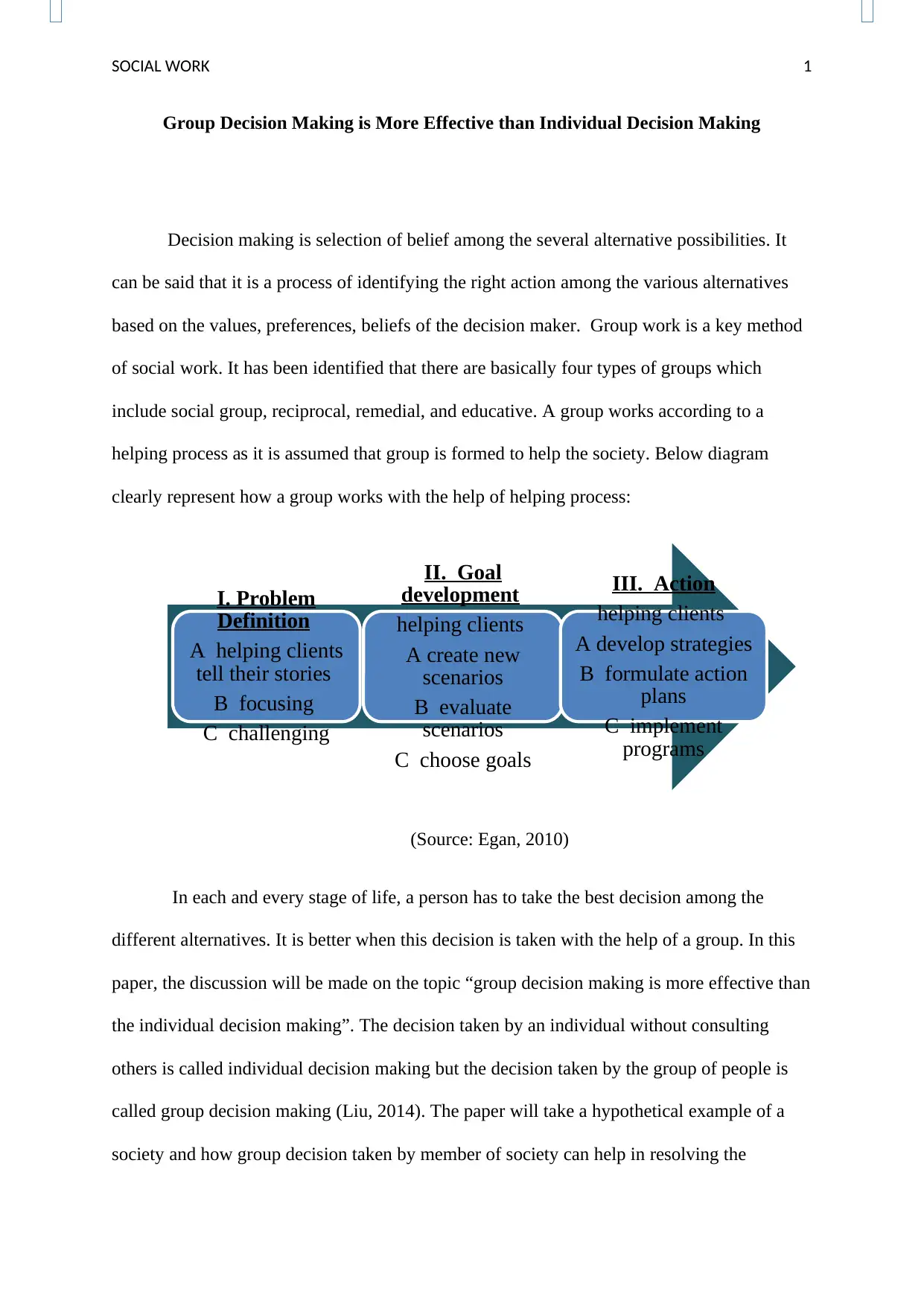
SOCIAL WORK 1
Group Decision Making is More Effective than Individual Decision Making
Decision making is selection of belief among the several alternative possibilities. It
can be said that it is a process of identifying the right action among the various alternatives
based on the values, preferences, beliefs of the decision maker. Group work is a key method
of social work. It has been identified that there are basically four types of groups which
include social group, reciprocal, remedial, and educative. A group works according to a
helping process as it is assumed that group is formed to help the society. Below diagram
clearly represent how a group works with the help of helping process:
(Source: Egan, 2010)
In each and every stage of life, a person has to take the best decision among the
different alternatives. It is better when this decision is taken with the help of a group. In this
paper, the discussion will be made on the topic “group decision making is more effective than
the individual decision making”. The decision taken by an individual without consulting
others is called individual decision making but the decision taken by the group of people is
called group decision making (Liu, 2014). The paper will take a hypothetical example of a
society and how group decision taken by member of society can help in resolving the
I. Problem
Definition
A helping clients
tell their stories
B focusing
C challenging
II. Goal
development
helping clients
A create new
scenarios
B evaluate
scenarios
C choose goals
III. Action
helping clients
A develop strategies
B formulate action
plans
C implement
programs
Group Decision Making is More Effective than Individual Decision Making
Decision making is selection of belief among the several alternative possibilities. It
can be said that it is a process of identifying the right action among the various alternatives
based on the values, preferences, beliefs of the decision maker. Group work is a key method
of social work. It has been identified that there are basically four types of groups which
include social group, reciprocal, remedial, and educative. A group works according to a
helping process as it is assumed that group is formed to help the society. Below diagram
clearly represent how a group works with the help of helping process:
(Source: Egan, 2010)
In each and every stage of life, a person has to take the best decision among the
different alternatives. It is better when this decision is taken with the help of a group. In this
paper, the discussion will be made on the topic “group decision making is more effective than
the individual decision making”. The decision taken by an individual without consulting
others is called individual decision making but the decision taken by the group of people is
called group decision making (Liu, 2014). The paper will take a hypothetical example of a
society and how group decision taken by member of society can help in resolving the
I. Problem
Definition
A helping clients
tell their stories
B focusing
C challenging
II. Goal
development
helping clients
A create new
scenarios
B evaluate
scenarios
C choose goals
III. Action
helping clients
A develop strategies
B formulate action
plans
C implement
programs

SOCIAL WORK 2
problem. The problem that is taken into consideration is the environmental challenges faced
by the society.
Information plays an important role in group decision making. In a group, each and
every member has some different information which helps to evaluate the right decision for
the issue. It is difficult for an individual to have all the information that is available to a group
of people and several individuals. Lack of information has a negative impact on the
decisions; the decision should be right among all the alternatives. Detailed information is
necessary to take the right decision which is gathered by a group of people. For example- In
the case of environmental challenges in a society; group decision is more effective because
members of different communities will have different information regarding the
environmental issue which is beneficial in handling the challenge. In a group, one person can
have information about the technical issues related to environment and how it can be handled
and another person from the same group can provide suggestions about the finances that the
resolution will require.
Diversity is also an important factor while decision making. The diversity comes into
effect when the decision is taken by a group and not by an individual. It is said that
heterogeneity is essential for successful decision making. Heterogeniety brings different
points of views, skills and ideas together in order to make an effective decision (Doel &
Kelly 2014). Group members play different role at different point of time such as initiating
information giving, opinion giving, clarifying, coordinating, elaborating and summarising. In
the group discussion, people have different points that affect the decision. Each and every
member has its own point of view which helps in decision making. The diversity of view is
an advantage of the group decision making (Shemla, Meyer, Greer, and Jehn, 2016). It is
observed that each member of the group has the variety of talent and new ideas which helps
in making the right decision. In individual decision making, a person can take the decision
problem. The problem that is taken into consideration is the environmental challenges faced
by the society.
Information plays an important role in group decision making. In a group, each and
every member has some different information which helps to evaluate the right decision for
the issue. It is difficult for an individual to have all the information that is available to a group
of people and several individuals. Lack of information has a negative impact on the
decisions; the decision should be right among all the alternatives. Detailed information is
necessary to take the right decision which is gathered by a group of people. For example- In
the case of environmental challenges in a society; group decision is more effective because
members of different communities will have different information regarding the
environmental issue which is beneficial in handling the challenge. In a group, one person can
have information about the technical issues related to environment and how it can be handled
and another person from the same group can provide suggestions about the finances that the
resolution will require.
Diversity is also an important factor while decision making. The diversity comes into
effect when the decision is taken by a group and not by an individual. It is said that
heterogeneity is essential for successful decision making. Heterogeniety brings different
points of views, skills and ideas together in order to make an effective decision (Doel &
Kelly 2014). Group members play different role at different point of time such as initiating
information giving, opinion giving, clarifying, coordinating, elaborating and summarising. In
the group discussion, people have different points that affect the decision. Each and every
member has its own point of view which helps in decision making. The diversity of view is
an advantage of the group decision making (Shemla, Meyer, Greer, and Jehn, 2016). It is
observed that each member of the group has the variety of talent and new ideas which helps
in making the right decision. In individual decision making, a person can take the decision
⊘ This is a preview!⊘
Do you want full access?
Subscribe today to unlock all pages.

Trusted by 1+ million students worldwide
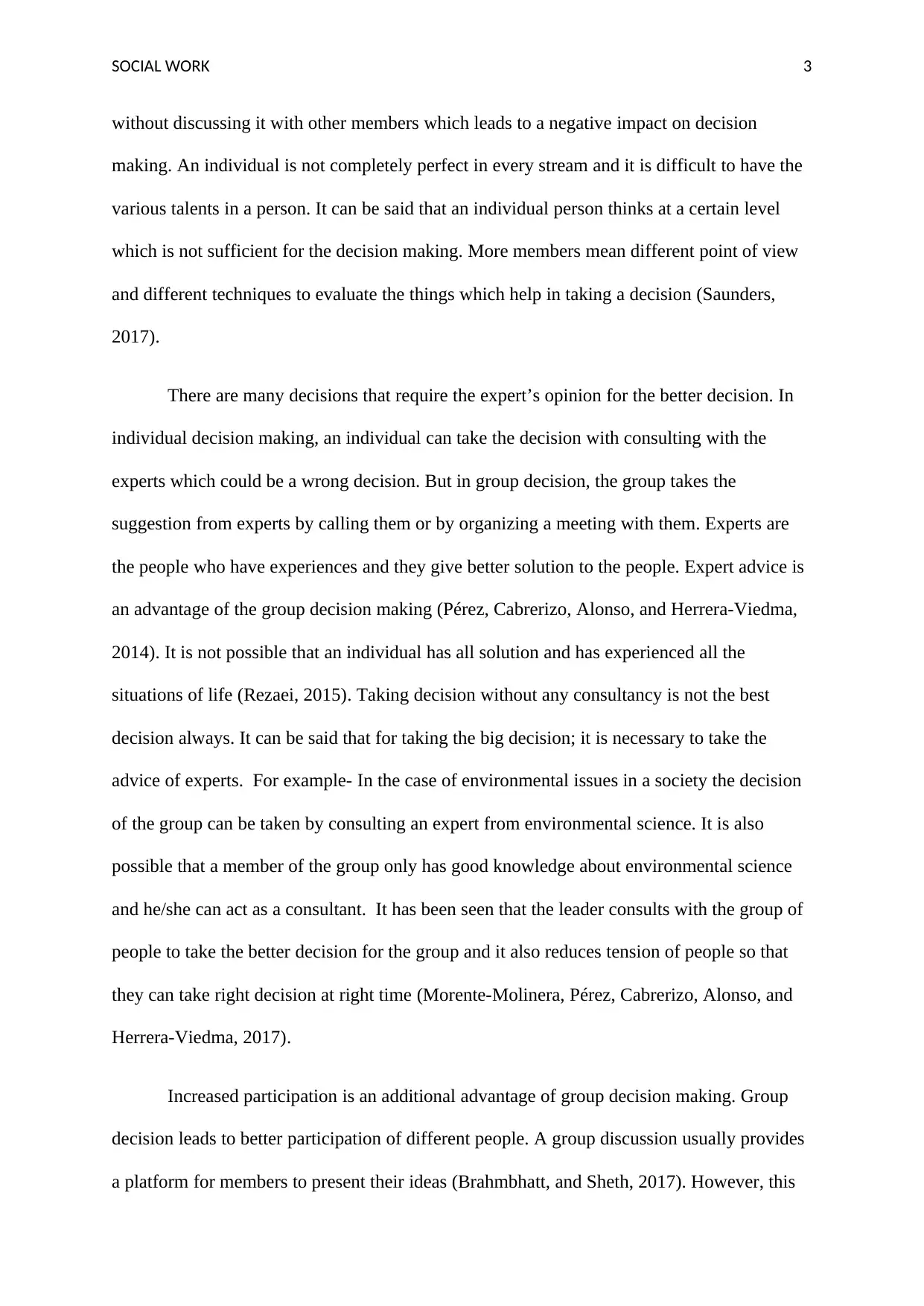
SOCIAL WORK 3
without discussing it with other members which leads to a negative impact on decision
making. An individual is not completely perfect in every stream and it is difficult to have the
various talents in a person. It can be said that an individual person thinks at a certain level
which is not sufficient for the decision making. More members mean different point of view
and different techniques to evaluate the things which help in taking a decision (Saunders,
2017).
There are many decisions that require the expert’s opinion for the better decision. In
individual decision making, an individual can take the decision with consulting with the
experts which could be a wrong decision. But in group decision, the group takes the
suggestion from experts by calling them or by organizing a meeting with them. Experts are
the people who have experiences and they give better solution to the people. Expert advice is
an advantage of the group decision making (Pérez, Cabrerizo, Alonso, and Herrera-Viedma,
2014). It is not possible that an individual has all solution and has experienced all the
situations of life (Rezaei, 2015). Taking decision without any consultancy is not the best
decision always. It can be said that for taking the big decision; it is necessary to take the
advice of experts. For example- In the case of environmental issues in a society the decision
of the group can be taken by consulting an expert from environmental science. It is also
possible that a member of the group only has good knowledge about environmental science
and he/she can act as a consultant. It has been seen that the leader consults with the group of
people to take the better decision for the group and it also reduces tension of people so that
they can take right decision at right time (Morente-Molinera, Pérez, Cabrerizo, Alonso, and
Herrera-Viedma, 2017).
Increased participation is an additional advantage of group decision making. Group
decision leads to better participation of different people. A group discussion usually provides
a platform for members to present their ideas (Brahmbhatt, and Sheth, 2017). However, this
without discussing it with other members which leads to a negative impact on decision
making. An individual is not completely perfect in every stream and it is difficult to have the
various talents in a person. It can be said that an individual person thinks at a certain level
which is not sufficient for the decision making. More members mean different point of view
and different techniques to evaluate the things which help in taking a decision (Saunders,
2017).
There are many decisions that require the expert’s opinion for the better decision. In
individual decision making, an individual can take the decision with consulting with the
experts which could be a wrong decision. But in group decision, the group takes the
suggestion from experts by calling them or by organizing a meeting with them. Experts are
the people who have experiences and they give better solution to the people. Expert advice is
an advantage of the group decision making (Pérez, Cabrerizo, Alonso, and Herrera-Viedma,
2014). It is not possible that an individual has all solution and has experienced all the
situations of life (Rezaei, 2015). Taking decision without any consultancy is not the best
decision always. It can be said that for taking the big decision; it is necessary to take the
advice of experts. For example- In the case of environmental issues in a society the decision
of the group can be taken by consulting an expert from environmental science. It is also
possible that a member of the group only has good knowledge about environmental science
and he/she can act as a consultant. It has been seen that the leader consults with the group of
people to take the better decision for the group and it also reduces tension of people so that
they can take right decision at right time (Morente-Molinera, Pérez, Cabrerizo, Alonso, and
Herrera-Viedma, 2017).
Increased participation is an additional advantage of group decision making. Group
decision leads to better participation of different people. A group discussion usually provides
a platform for members to present their ideas (Brahmbhatt, and Sheth, 2017). However, this
Paraphrase This Document
Need a fresh take? Get an instant paraphrase of this document with our AI Paraphraser
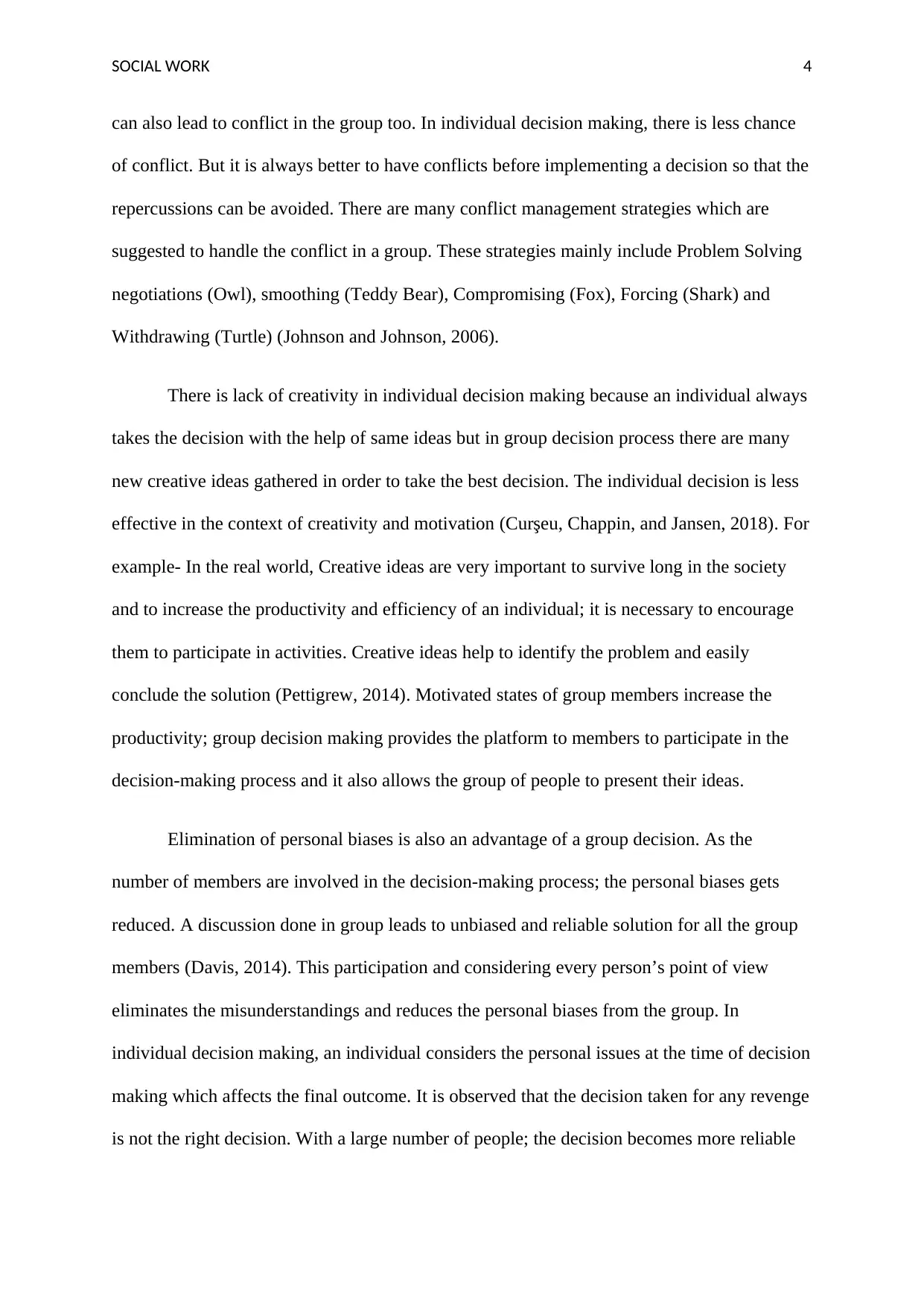
SOCIAL WORK 4
can also lead to conflict in the group too. In individual decision making, there is less chance
of conflict. But it is always better to have conflicts before implementing a decision so that the
repercussions can be avoided. There are many conflict management strategies which are
suggested to handle the conflict in a group. These strategies mainly include Problem Solving
negotiations (Owl), smoothing (Teddy Bear), Compromising (Fox), Forcing (Shark) and
Withdrawing (Turtle) (Johnson and Johnson, 2006).
There is lack of creativity in individual decision making because an individual always
takes the decision with the help of same ideas but in group decision process there are many
new creative ideas gathered in order to take the best decision. The individual decision is less
effective in the context of creativity and motivation (Curşeu, Chappin, and Jansen, 2018). For
example- In the real world, Creative ideas are very important to survive long in the society
and to increase the productivity and efficiency of an individual; it is necessary to encourage
them to participate in activities. Creative ideas help to identify the problem and easily
conclude the solution (Pettigrew, 2014). Motivated states of group members increase the
productivity; group decision making provides the platform to members to participate in the
decision-making process and it also allows the group of people to present their ideas.
Elimination of personal biases is also an advantage of a group decision. As the
number of members are involved in the decision-making process; the personal biases gets
reduced. A discussion done in group leads to unbiased and reliable solution for all the group
members (Davis, 2014). This participation and considering every person’s point of view
eliminates the misunderstandings and reduces the personal biases from the group. In
individual decision making, an individual considers the personal issues at the time of decision
making which affects the final outcome. It is observed that the decision taken for any revenge
is not the right decision. With a large number of people; the decision becomes more reliable
can also lead to conflict in the group too. In individual decision making, there is less chance
of conflict. But it is always better to have conflicts before implementing a decision so that the
repercussions can be avoided. There are many conflict management strategies which are
suggested to handle the conflict in a group. These strategies mainly include Problem Solving
negotiations (Owl), smoothing (Teddy Bear), Compromising (Fox), Forcing (Shark) and
Withdrawing (Turtle) (Johnson and Johnson, 2006).
There is lack of creativity in individual decision making because an individual always
takes the decision with the help of same ideas but in group decision process there are many
new creative ideas gathered in order to take the best decision. The individual decision is less
effective in the context of creativity and motivation (Curşeu, Chappin, and Jansen, 2018). For
example- In the real world, Creative ideas are very important to survive long in the society
and to increase the productivity and efficiency of an individual; it is necessary to encourage
them to participate in activities. Creative ideas help to identify the problem and easily
conclude the solution (Pettigrew, 2014). Motivated states of group members increase the
productivity; group decision making provides the platform to members to participate in the
decision-making process and it also allows the group of people to present their ideas.
Elimination of personal biases is also an advantage of a group decision. As the
number of members are involved in the decision-making process; the personal biases gets
reduced. A discussion done in group leads to unbiased and reliable solution for all the group
members (Davis, 2014). This participation and considering every person’s point of view
eliminates the misunderstandings and reduces the personal biases from the group. In
individual decision making, an individual considers the personal issues at the time of decision
making which affects the final outcome. It is observed that the decision taken for any revenge
is not the right decision. With a large number of people; the decision becomes more reliable
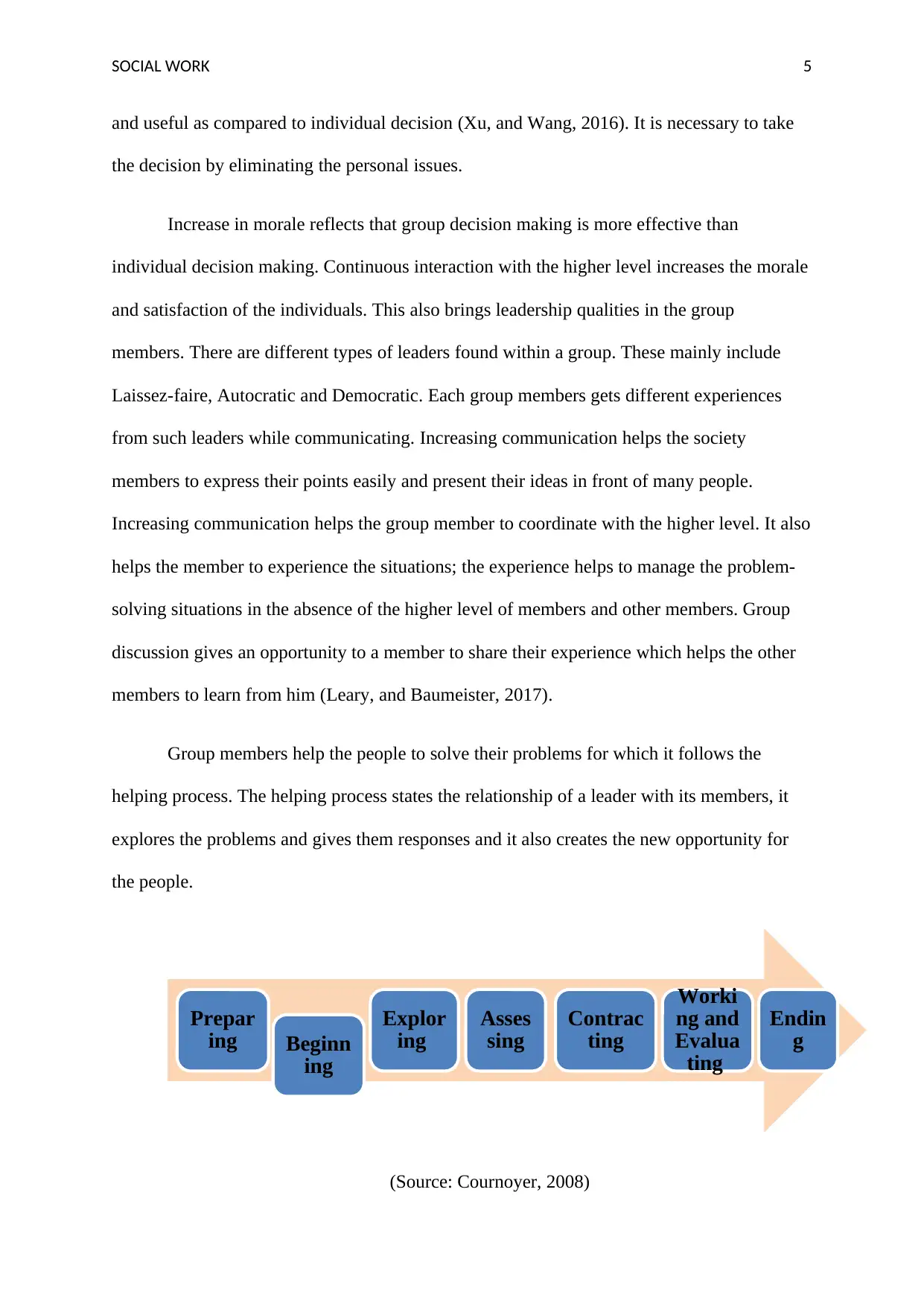
SOCIAL WORK 5
and useful as compared to individual decision (Xu, and Wang, 2016). It is necessary to take
the decision by eliminating the personal issues.
Increase in morale reflects that group decision making is more effective than
individual decision making. Continuous interaction with the higher level increases the morale
and satisfaction of the individuals. This also brings leadership qualities in the group
members. There are different types of leaders found within a group. These mainly include
Laissez-faire, Autocratic and Democratic. Each group members gets different experiences
from such leaders while communicating. Increasing communication helps the society
members to express their points easily and present their ideas in front of many people.
Increasing communication helps the group member to coordinate with the higher level. It also
helps the member to experience the situations; the experience helps to manage the problem-
solving situations in the absence of the higher level of members and other members. Group
discussion gives an opportunity to a member to share their experience which helps the other
members to learn from him (Leary, and Baumeister, 2017).
Group members help the people to solve their problems for which it follows the
helping process. The helping process states the relationship of a leader with its members, it
explores the problems and gives them responses and it also creates the new opportunity for
the people.
(Source: Cournoyer, 2008)
Prepar
ing Beginn
ing
Explor
ing
Asses
sing
Contrac
ting
Worki
ng and
Evalua
ting
Endin
g
and useful as compared to individual decision (Xu, and Wang, 2016). It is necessary to take
the decision by eliminating the personal issues.
Increase in morale reflects that group decision making is more effective than
individual decision making. Continuous interaction with the higher level increases the morale
and satisfaction of the individuals. This also brings leadership qualities in the group
members. There are different types of leaders found within a group. These mainly include
Laissez-faire, Autocratic and Democratic. Each group members gets different experiences
from such leaders while communicating. Increasing communication helps the society
members to express their points easily and present their ideas in front of many people.
Increasing communication helps the group member to coordinate with the higher level. It also
helps the member to experience the situations; the experience helps to manage the problem-
solving situations in the absence of the higher level of members and other members. Group
discussion gives an opportunity to a member to share their experience which helps the other
members to learn from him (Leary, and Baumeister, 2017).
Group members help the people to solve their problems for which it follows the
helping process. The helping process states the relationship of a leader with its members, it
explores the problems and gives them responses and it also creates the new opportunity for
the people.
(Source: Cournoyer, 2008)
Prepar
ing Beginn
ing
Explor
ing
Asses
sing
Contrac
ting
Worki
ng and
Evalua
ting
Endin
g
⊘ This is a preview!⊘
Do you want full access?
Subscribe today to unlock all pages.

Trusted by 1+ million students worldwide
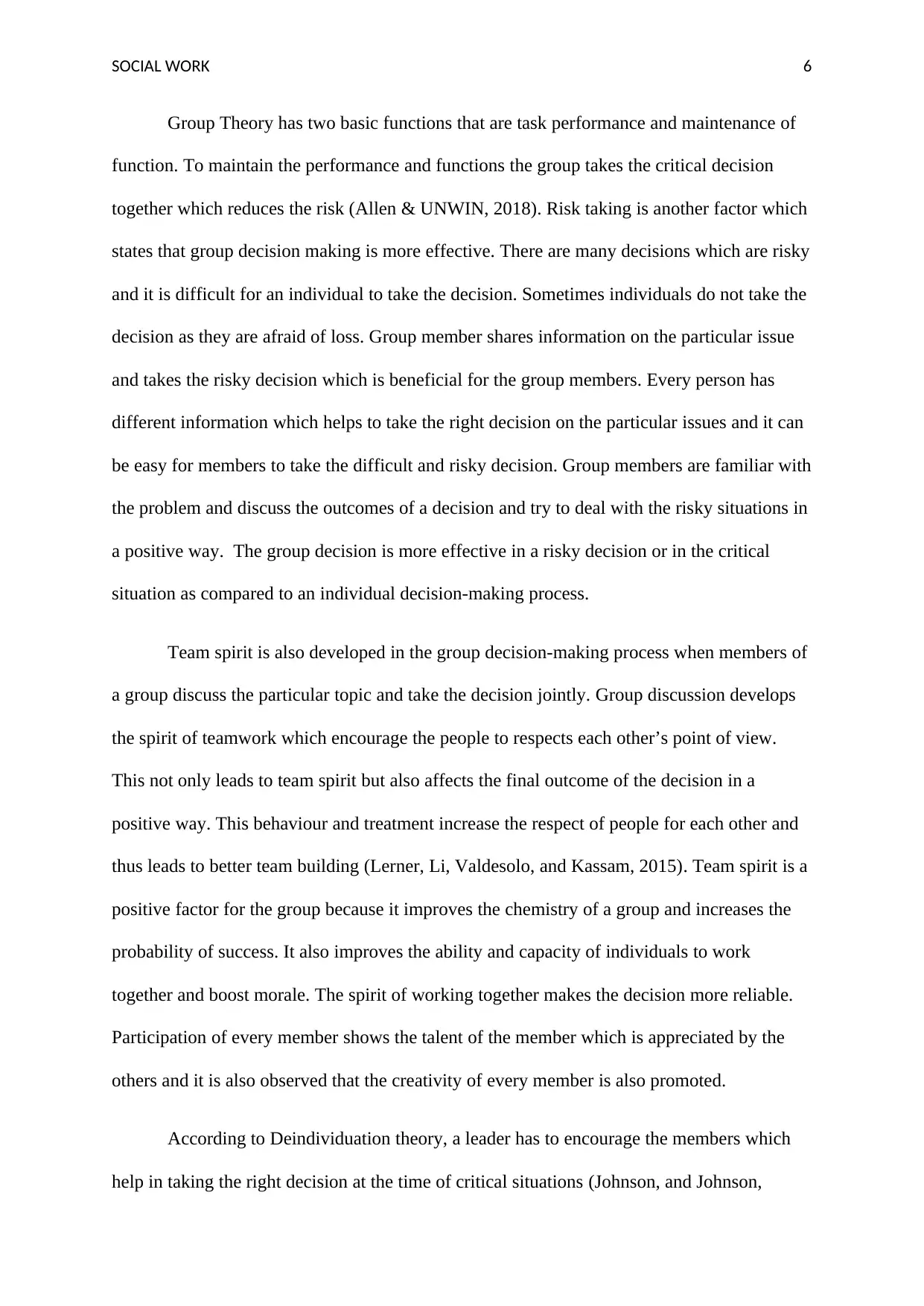
SOCIAL WORK 6
Group Theory has two basic functions that are task performance and maintenance of
function. To maintain the performance and functions the group takes the critical decision
together which reduces the risk (Allen & UNWIN, 2018). Risk taking is another factor which
states that group decision making is more effective. There are many decisions which are risky
and it is difficult for an individual to take the decision. Sometimes individuals do not take the
decision as they are afraid of loss. Group member shares information on the particular issue
and takes the risky decision which is beneficial for the group members. Every person has
different information which helps to take the right decision on the particular issues and it can
be easy for members to take the difficult and risky decision. Group members are familiar with
the problem and discuss the outcomes of a decision and try to deal with the risky situations in
a positive way. The group decision is more effective in a risky decision or in the critical
situation as compared to an individual decision-making process.
Team spirit is also developed in the group decision-making process when members of
a group discuss the particular topic and take the decision jointly. Group discussion develops
the spirit of teamwork which encourage the people to respects each other’s point of view.
This not only leads to team spirit but also affects the final outcome of the decision in a
positive way. This behaviour and treatment increase the respect of people for each other and
thus leads to better team building (Lerner, Li, Valdesolo, and Kassam, 2015). Team spirit is a
positive factor for the group because it improves the chemistry of a group and increases the
probability of success. It also improves the ability and capacity of individuals to work
together and boost morale. The spirit of working together makes the decision more reliable.
Participation of every member shows the talent of the member which is appreciated by the
others and it is also observed that the creativity of every member is also promoted.
According to Deindividuation theory, a leader has to encourage the members which
help in taking the right decision at the time of critical situations (Johnson, and Johnson,
Group Theory has two basic functions that are task performance and maintenance of
function. To maintain the performance and functions the group takes the critical decision
together which reduces the risk (Allen & UNWIN, 2018). Risk taking is another factor which
states that group decision making is more effective. There are many decisions which are risky
and it is difficult for an individual to take the decision. Sometimes individuals do not take the
decision as they are afraid of loss. Group member shares information on the particular issue
and takes the risky decision which is beneficial for the group members. Every person has
different information which helps to take the right decision on the particular issues and it can
be easy for members to take the difficult and risky decision. Group members are familiar with
the problem and discuss the outcomes of a decision and try to deal with the risky situations in
a positive way. The group decision is more effective in a risky decision or in the critical
situation as compared to an individual decision-making process.
Team spirit is also developed in the group decision-making process when members of
a group discuss the particular topic and take the decision jointly. Group discussion develops
the spirit of teamwork which encourage the people to respects each other’s point of view.
This not only leads to team spirit but also affects the final outcome of the decision in a
positive way. This behaviour and treatment increase the respect of people for each other and
thus leads to better team building (Lerner, Li, Valdesolo, and Kassam, 2015). Team spirit is a
positive factor for the group because it improves the chemistry of a group and increases the
probability of success. It also improves the ability and capacity of individuals to work
together and boost morale. The spirit of working together makes the decision more reliable.
Participation of every member shows the talent of the member which is appreciated by the
others and it is also observed that the creativity of every member is also promoted.
According to Deindividuation theory, a leader has to encourage the members which
help in taking the right decision at the time of critical situations (Johnson, and Johnson,
Paraphrase This Document
Need a fresh take? Get an instant paraphrase of this document with our AI Paraphraser
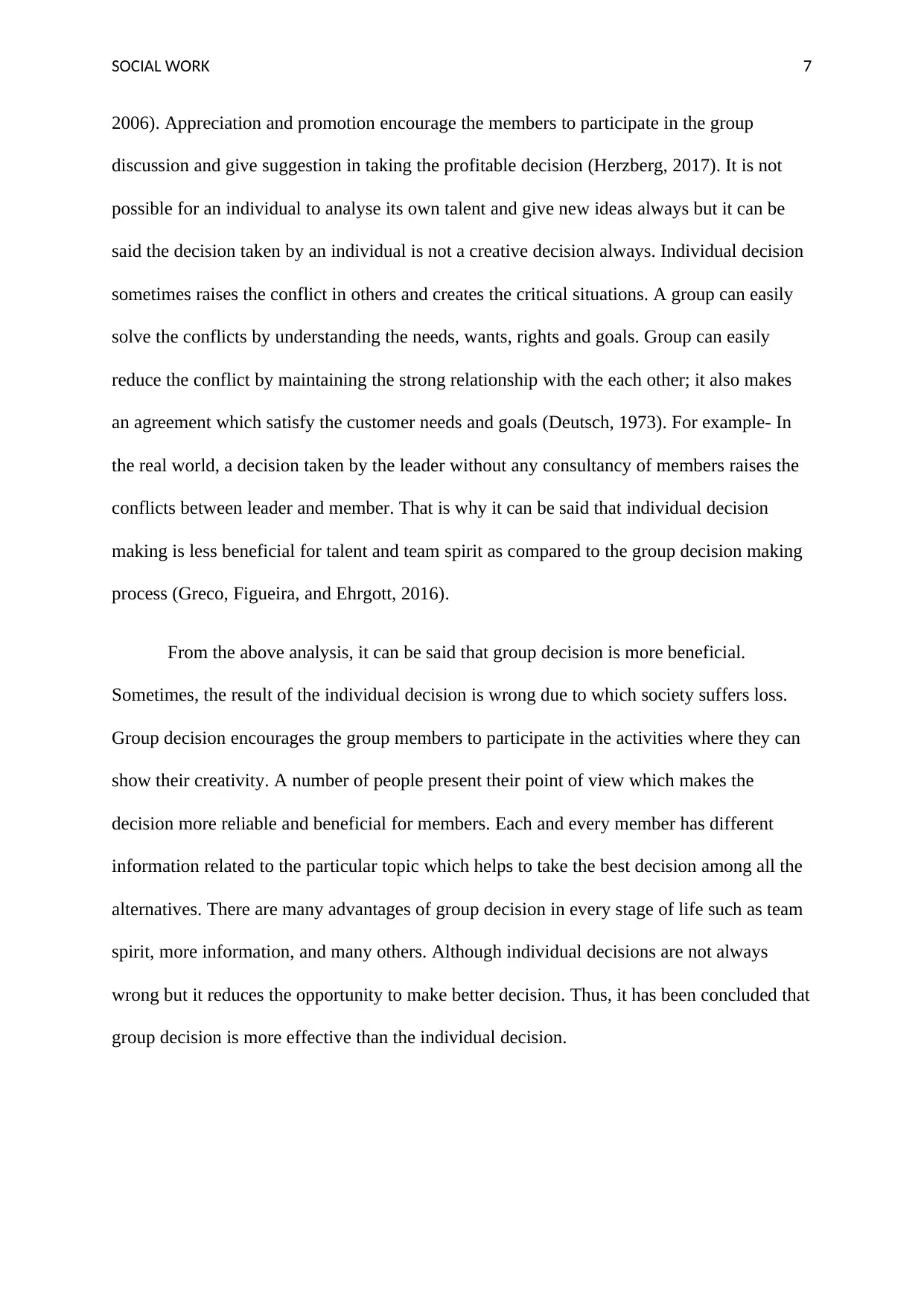
SOCIAL WORK 7
2006). Appreciation and promotion encourage the members to participate in the group
discussion and give suggestion in taking the profitable decision (Herzberg, 2017). It is not
possible for an individual to analyse its own talent and give new ideas always but it can be
said the decision taken by an individual is not a creative decision always. Individual decision
sometimes raises the conflict in others and creates the critical situations. A group can easily
solve the conflicts by understanding the needs, wants, rights and goals. Group can easily
reduce the conflict by maintaining the strong relationship with the each other; it also makes
an agreement which satisfy the customer needs and goals (Deutsch, 1973). For example- In
the real world, a decision taken by the leader without any consultancy of members raises the
conflicts between leader and member. That is why it can be said that individual decision
making is less beneficial for talent and team spirit as compared to the group decision making
process (Greco, Figueira, and Ehrgott, 2016).
From the above analysis, it can be said that group decision is more beneficial.
Sometimes, the result of the individual decision is wrong due to which society suffers loss.
Group decision encourages the group members to participate in the activities where they can
show their creativity. A number of people present their point of view which makes the
decision more reliable and beneficial for members. Each and every member has different
information related to the particular topic which helps to take the best decision among all the
alternatives. There are many advantages of group decision in every stage of life such as team
spirit, more information, and many others. Although individual decisions are not always
wrong but it reduces the opportunity to make better decision. Thus, it has been concluded that
group decision is more effective than the individual decision.
2006). Appreciation and promotion encourage the members to participate in the group
discussion and give suggestion in taking the profitable decision (Herzberg, 2017). It is not
possible for an individual to analyse its own talent and give new ideas always but it can be
said the decision taken by an individual is not a creative decision always. Individual decision
sometimes raises the conflict in others and creates the critical situations. A group can easily
solve the conflicts by understanding the needs, wants, rights and goals. Group can easily
reduce the conflict by maintaining the strong relationship with the each other; it also makes
an agreement which satisfy the customer needs and goals (Deutsch, 1973). For example- In
the real world, a decision taken by the leader without any consultancy of members raises the
conflicts between leader and member. That is why it can be said that individual decision
making is less beneficial for talent and team spirit as compared to the group decision making
process (Greco, Figueira, and Ehrgott, 2016).
From the above analysis, it can be said that group decision is more beneficial.
Sometimes, the result of the individual decision is wrong due to which society suffers loss.
Group decision encourages the group members to participate in the activities where they can
show their creativity. A number of people present their point of view which makes the
decision more reliable and beneficial for members. Each and every member has different
information related to the particular topic which helps to take the best decision among all the
alternatives. There are many advantages of group decision in every stage of life such as team
spirit, more information, and many others. Although individual decisions are not always
wrong but it reduces the opportunity to make better decision. Thus, it has been concluded that
group decision is more effective than the individual decision.
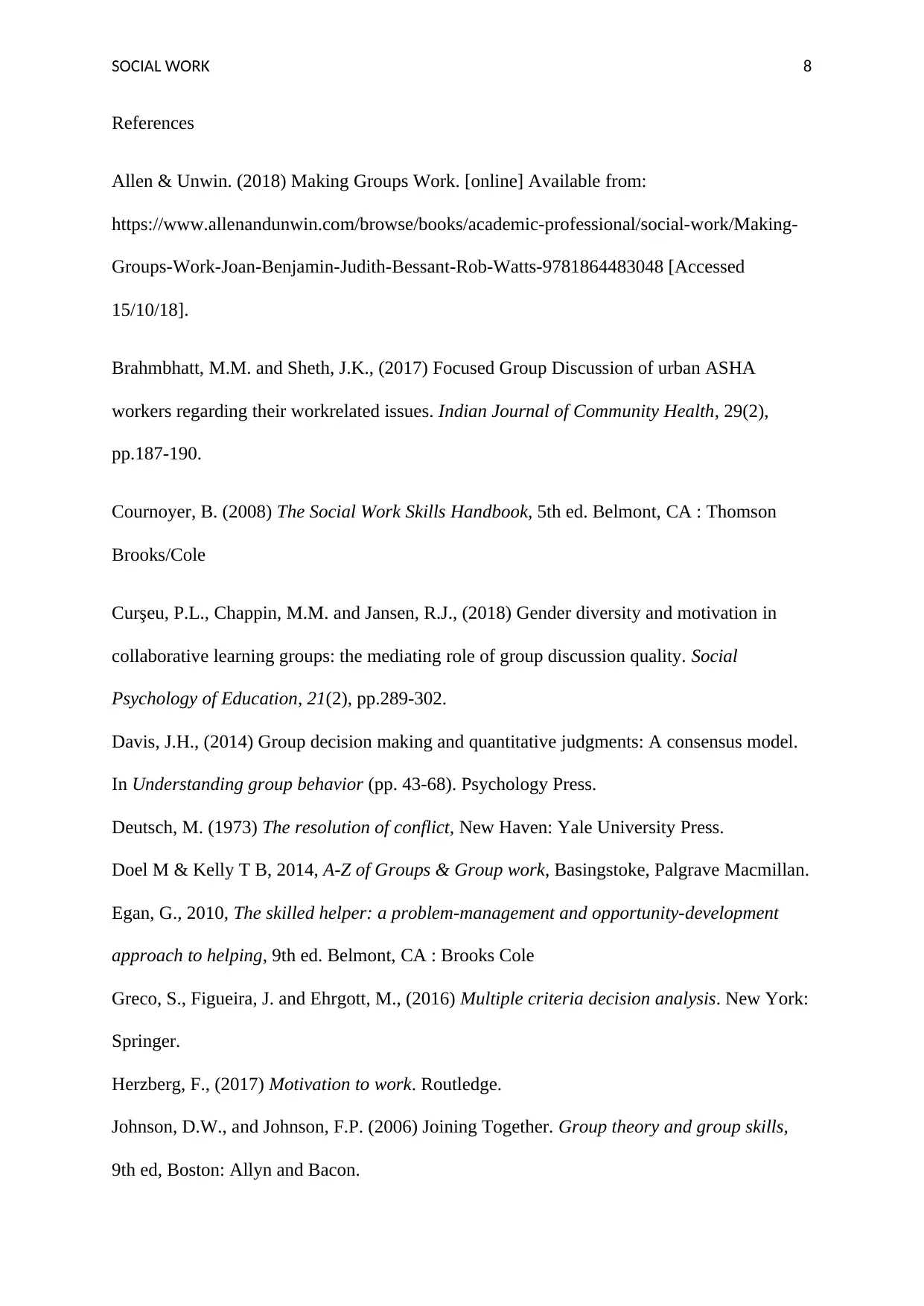
SOCIAL WORK 8
References
Allen & Unwin. (2018) Making Groups Work. [online] Available from:
https://www.allenandunwin.com/browse/books/academic-professional/social-work/Making-
Groups-Work-Joan-Benjamin-Judith-Bessant-Rob-Watts-9781864483048 [Accessed
15/10/18].
Brahmbhatt, M.M. and Sheth, J.K., (2017) Focused Group Discussion of urban ASHA
workers regarding their workrelated issues. Indian Journal of Community Health, 29(2),
pp.187-190.
Cournoyer, B. (2008) The Social Work Skills Handbook, 5th ed. Belmont, CA : Thomson
Brooks/Cole
Curşeu, P.L., Chappin, M.M. and Jansen, R.J., (2018) Gender diversity and motivation in
collaborative learning groups: the mediating role of group discussion quality. Social
Psychology of Education, 21(2), pp.289-302.
Davis, J.H., (2014) Group decision making and quantitative judgments: A consensus model.
In Understanding group behavior (pp. 43-68). Psychology Press.
Deutsch, M. (1973) The resolution of conflict, New Haven: Yale University Press.
Doel M & Kelly T B, 2014, A-Z of Groups & Group work, Basingstoke, Palgrave Macmillan.
Egan, G., 2010, The skilled helper: a problem-management and opportunity-development
approach to helping, 9th ed. Belmont, CA : Brooks Cole
Greco, S., Figueira, J. and Ehrgott, M., (2016) Multiple criteria decision analysis. New York:
Springer.
Herzberg, F., (2017) Motivation to work. Routledge.
Johnson, D.W., and Johnson, F.P. (2006) Joining Together. Group theory and group skills,
9th ed, Boston: Allyn and Bacon.
References
Allen & Unwin. (2018) Making Groups Work. [online] Available from:
https://www.allenandunwin.com/browse/books/academic-professional/social-work/Making-
Groups-Work-Joan-Benjamin-Judith-Bessant-Rob-Watts-9781864483048 [Accessed
15/10/18].
Brahmbhatt, M.M. and Sheth, J.K., (2017) Focused Group Discussion of urban ASHA
workers regarding their workrelated issues. Indian Journal of Community Health, 29(2),
pp.187-190.
Cournoyer, B. (2008) The Social Work Skills Handbook, 5th ed. Belmont, CA : Thomson
Brooks/Cole
Curşeu, P.L., Chappin, M.M. and Jansen, R.J., (2018) Gender diversity and motivation in
collaborative learning groups: the mediating role of group discussion quality. Social
Psychology of Education, 21(2), pp.289-302.
Davis, J.H., (2014) Group decision making and quantitative judgments: A consensus model.
In Understanding group behavior (pp. 43-68). Psychology Press.
Deutsch, M. (1973) The resolution of conflict, New Haven: Yale University Press.
Doel M & Kelly T B, 2014, A-Z of Groups & Group work, Basingstoke, Palgrave Macmillan.
Egan, G., 2010, The skilled helper: a problem-management and opportunity-development
approach to helping, 9th ed. Belmont, CA : Brooks Cole
Greco, S., Figueira, J. and Ehrgott, M., (2016) Multiple criteria decision analysis. New York:
Springer.
Herzberg, F., (2017) Motivation to work. Routledge.
Johnson, D.W., and Johnson, F.P. (2006) Joining Together. Group theory and group skills,
9th ed, Boston: Allyn and Bacon.
⊘ This is a preview!⊘
Do you want full access?
Subscribe today to unlock all pages.

Trusted by 1+ million students worldwide
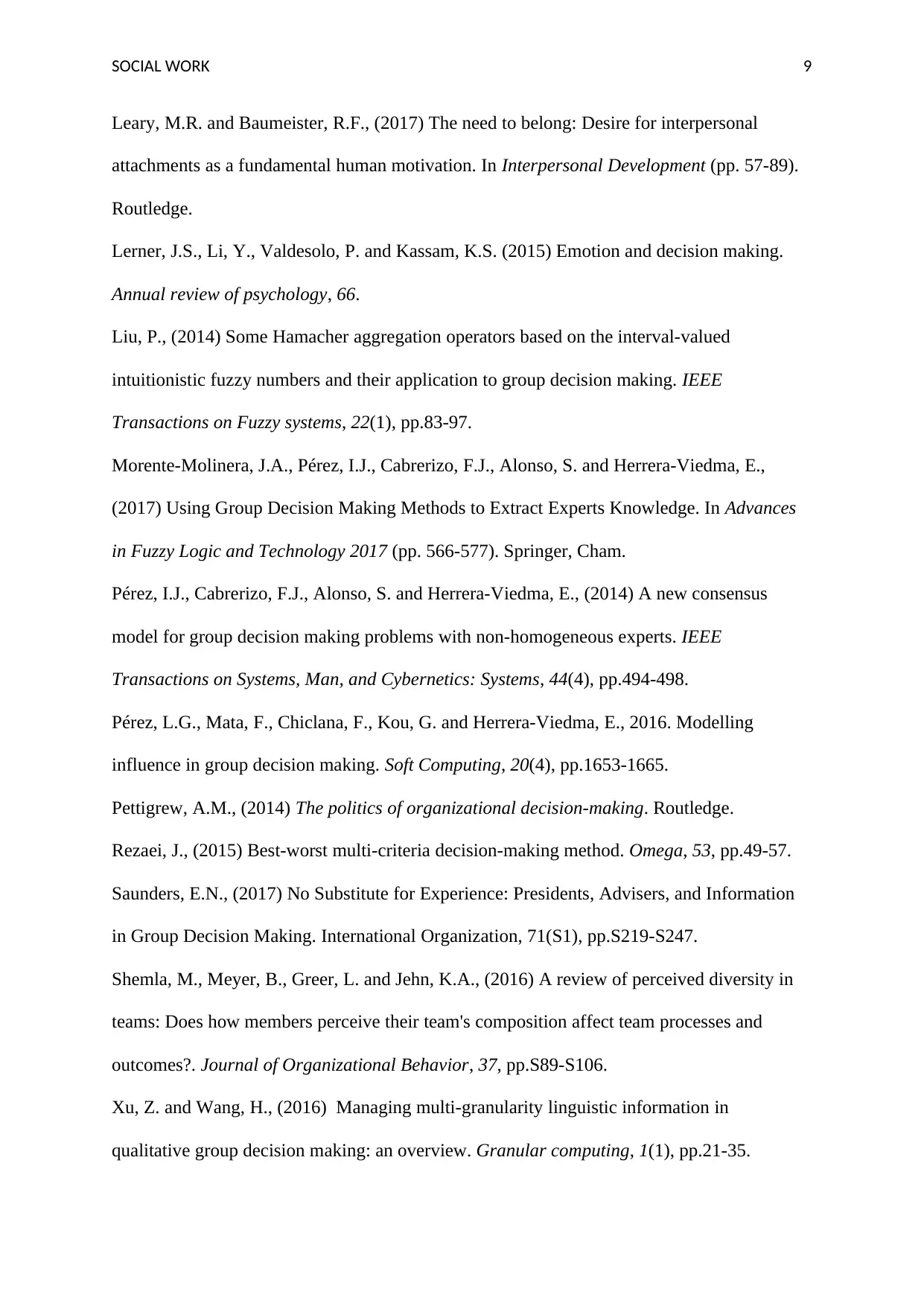
SOCIAL WORK 9
Leary, M.R. and Baumeister, R.F., (2017) The need to belong: Desire for interpersonal
attachments as a fundamental human motivation. In Interpersonal Development (pp. 57-89).
Routledge.
Lerner, J.S., Li, Y., Valdesolo, P. and Kassam, K.S. (2015) Emotion and decision making.
Annual review of psychology, 66.
Liu, P., (2014) Some Hamacher aggregation operators based on the interval-valued
intuitionistic fuzzy numbers and their application to group decision making. IEEE
Transactions on Fuzzy systems, 22(1), pp.83-97.
Morente-Molinera, J.A., Pérez, I.J., Cabrerizo, F.J., Alonso, S. and Herrera-Viedma, E.,
(2017) Using Group Decision Making Methods to Extract Experts Knowledge. In Advances
in Fuzzy Logic and Technology 2017 (pp. 566-577). Springer, Cham.
Pérez, I.J., Cabrerizo, F.J., Alonso, S. and Herrera-Viedma, E., (2014) A new consensus
model for group decision making problems with non-homogeneous experts. IEEE
Transactions on Systems, Man, and Cybernetics: Systems, 44(4), pp.494-498.
Pérez, L.G., Mata, F., Chiclana, F., Kou, G. and Herrera-Viedma, E., 2016. Modelling
influence in group decision making. Soft Computing, 20(4), pp.1653-1665.
Pettigrew, A.M., (2014) The politics of organizational decision-making. Routledge.
Rezaei, J., (2015) Best-worst multi-criteria decision-making method. Omega, 53, pp.49-57.
Saunders, E.N., (2017) No Substitute for Experience: Presidents, Advisers, and Information
in Group Decision Making. International Organization, 71(S1), pp.S219-S247.
Shemla, M., Meyer, B., Greer, L. and Jehn, K.A., (2016) A review of perceived diversity in
teams: Does how members perceive their team's composition affect team processes and
outcomes?. Journal of Organizational Behavior, 37, pp.S89-S106.
Xu, Z. and Wang, H., (2016) Managing multi-granularity linguistic information in
qualitative group decision making: an overview. Granular computing, 1(1), pp.21-35.
Leary, M.R. and Baumeister, R.F., (2017) The need to belong: Desire for interpersonal
attachments as a fundamental human motivation. In Interpersonal Development (pp. 57-89).
Routledge.
Lerner, J.S., Li, Y., Valdesolo, P. and Kassam, K.S. (2015) Emotion and decision making.
Annual review of psychology, 66.
Liu, P., (2014) Some Hamacher aggregation operators based on the interval-valued
intuitionistic fuzzy numbers and their application to group decision making. IEEE
Transactions on Fuzzy systems, 22(1), pp.83-97.
Morente-Molinera, J.A., Pérez, I.J., Cabrerizo, F.J., Alonso, S. and Herrera-Viedma, E.,
(2017) Using Group Decision Making Methods to Extract Experts Knowledge. In Advances
in Fuzzy Logic and Technology 2017 (pp. 566-577). Springer, Cham.
Pérez, I.J., Cabrerizo, F.J., Alonso, S. and Herrera-Viedma, E., (2014) A new consensus
model for group decision making problems with non-homogeneous experts. IEEE
Transactions on Systems, Man, and Cybernetics: Systems, 44(4), pp.494-498.
Pérez, L.G., Mata, F., Chiclana, F., Kou, G. and Herrera-Viedma, E., 2016. Modelling
influence in group decision making. Soft Computing, 20(4), pp.1653-1665.
Pettigrew, A.M., (2014) The politics of organizational decision-making. Routledge.
Rezaei, J., (2015) Best-worst multi-criteria decision-making method. Omega, 53, pp.49-57.
Saunders, E.N., (2017) No Substitute for Experience: Presidents, Advisers, and Information
in Group Decision Making. International Organization, 71(S1), pp.S219-S247.
Shemla, M., Meyer, B., Greer, L. and Jehn, K.A., (2016) A review of perceived diversity in
teams: Does how members perceive their team's composition affect team processes and
outcomes?. Journal of Organizational Behavior, 37, pp.S89-S106.
Xu, Z. and Wang, H., (2016) Managing multi-granularity linguistic information in
qualitative group decision making: an overview. Granular computing, 1(1), pp.21-35.
1 out of 10
Related Documents
Your All-in-One AI-Powered Toolkit for Academic Success.
+13062052269
info@desklib.com
Available 24*7 on WhatsApp / Email
![[object Object]](/_next/static/media/star-bottom.7253800d.svg)
Unlock your academic potential
Copyright © 2020–2025 A2Z Services. All Rights Reserved. Developed and managed by ZUCOL.





